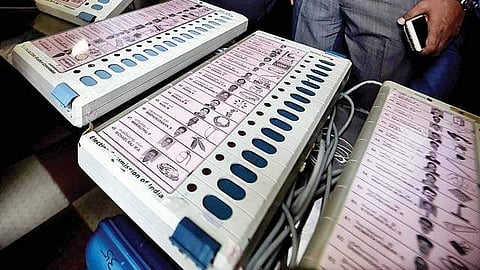

NEW DELHI: A day ahead of expiry of its term, the Law Commission today endorsed the Modi government's proposal to hold simultaneous polls to Lok Sabha and state assemblies, saying it will prevent the country from being in constant election mode, but it sought further public discourse on the issue before arriving at a final decision.
The panel in its draft report also said the exercise cannot be held in the present constitutional framework, and suggested changes required to carry out the two sets of polls together.
"Simultaneous polls would save public money, help reduce the burden on administrative setup and security forces and ensure better implementation of government policies. If simultaneous polls are held, the administrative machinery of the country will be continuously engaged in developmental activities, rather than in electioneering," the panel said.
The draft report along with an appeal was put in public domain seeking views from all stakeholders on holding simultaneous elections to the LS and state assemblies, except in Jammu and Kashmir.
A copy of the report has also been submitted to the government.
Holding that simultaneous elections were not possible within the existing framework of the Constitution, the panel recommended changes to the Articles dealing with terms of Houses and convening of sessions.
Noting that some of the points "would still remain to be pondered upon", the panel issued a public appeal saying, it is desirable to have further discussions and examination on the matter, involving all the stakeholders, once again, before making final recommendations to the government.
The three-year term of the panel is ending tomorrow.
Giving three options to carry out the exercise, the panel said elections to 12 state assemblies and one Union Territory could be synchronised with LS polls in 2019.
It pointed out that out of these, elections in five states -- Andhra Pradesh, Arunachal Pradesh, Odisha, Sikkim and Telangana -- are due with Lok Sabha polls, and hence "stand synchronised".
The report said if there is a political will, and consensus is arrived at, elections to four states of Haryana, Jharkhand, Maharashtra and Union Territory of Delhi, can also be held along with Lok Sabha and the five states.
In case of four other states - Chhattisgarh, Madhya Pradesh, Mizoram and Rajasthan - where elections are due later this year or or early January of 2019 - an extension of up to six months is required to attain synchronisation with the general elections in 2019, it said, adding this will entail amendment to Article 172 of the Constitution which deals with term of assemblies.
In case of the remaining 16 states and Puducherry, holding simultaneous elections in 2019 will not be practicable, therefore, the elections to these assemblies can be conducted towards the end of 2021, which will be approximately midway of the term of the LS, assuming that the term of the Seventeenth Lok Sabha begins in mid of 2019, the report said.
It said, in such a scenario, the maximum period by which any state assembly is to be extended will be by 13 months (like in Bihar) and the maximum period of curtailment is 17 months (like in the case of Karnataka).
The term of state assemblies so constituted as a result of the polls in 2021 will be only for 30 months or till June 2024, whichever is earlier.
"Thereafter, elections to the House of the People and all the state legislative assemblies and union territories can be held together from 2024, completely synchronising the elections," it suggested.
As per the second option suggested by the panel, once the elections to 12 states and one Union territory are synchronised along with the 2019 LS elections and the remaining 16 states and one union territory by the end of 2021, the elections will stand synchronised in such a manner that they are held only twice in five years, repeating the cycle of the elections to the Lok Sabha and 13 states, including one UT in mid-2024 and elections to 17 states, including one Union Territory by the end of 2026.
"This will result in elections only twice in a period of five years," it said.
The third option states that if it is not possible to hold simultaneous elections under the first two options, then, it is recommended that all elections due in one calendar year be held together during such part of the year, which is conducive to all the state legislatures involved "and/or" Lok Sabha (if sooner dissolved).
Political parties, including Congress, raise issue of simultaneous polls at Election Commission meet
Debate on simultaneous polls a healthy sign of democracy; tribute to Vajpayee: PM Modi
Simultaneous polls not possible now: Chief Election Commissioner Rawat
BJP chief Amit Shah writes to law panel in support of simultaneous polls
BJD, YSR Congress support simultaneous polls